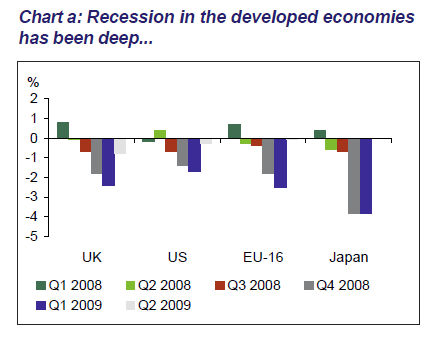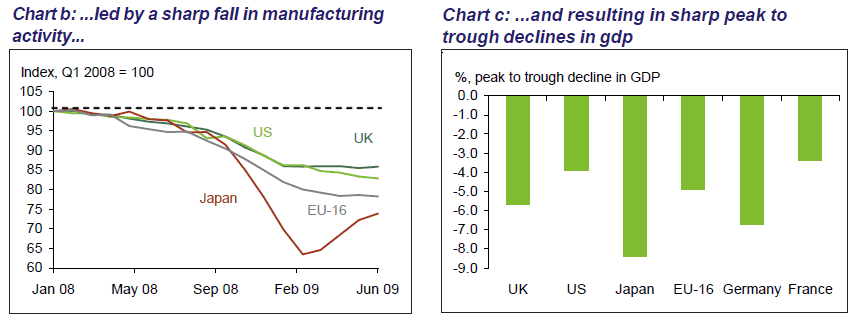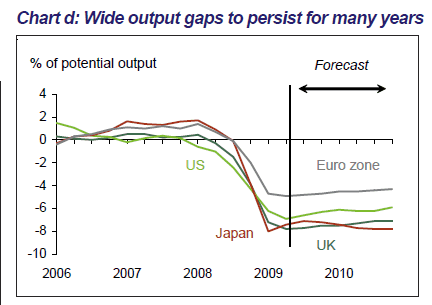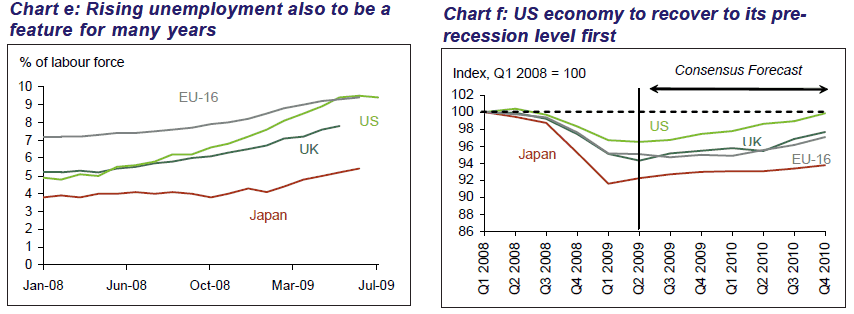Remarkable Economic Underway in Asia, Same True for the Western Economies?
Economics / Economic Recovery Aug 17, 2009 - 03:10 AM GMTBy: Lloyds_TSB
 It is clear that a remarkable economic recovery is underway in Asia, led by China and India, but is the same true of the developed economies? Recent economic figures for Germany and France have prompted many commentators to predict that recovery has started. But is this true or is it more a levelling off of activity? Moreover, not only have financial markets been expecting recovery, as shown by the strong rise in equities in recent months, but they have been looking for it to start in Europe ahead of the US. Further, the expectation was that, within Europe, the UK would be the first out of recession. Currency markets in particular have been marking down the US dollar relative to the pound, the euro and the yen.
It is clear that a remarkable economic recovery is underway in Asia, led by China and India, but is the same true of the developed economies? Recent economic figures for Germany and France have prompted many commentators to predict that recovery has started. But is this true or is it more a levelling off of activity? Moreover, not only have financial markets been expecting recovery, as shown by the strong rise in equities in recent months, but they have been looking for it to start in Europe ahead of the US. Further, the expectation was that, within Europe, the UK would be the first out of recession. Currency markets in particular have been marking down the US dollar relative to the pound, the euro and the yen.
 Developed countries gdp may have stopped falling...
Developed countries gdp may have stopped falling...
What are we to make of these perceptions in the context of the gdp figures for Q2 that have just been released? The analysis below suggests that output may have stopped falling in the developed economies but that recovery is still some way off. And despite perceptions, the US looks like being the first economy to get closer to the output level reached prior to the start of the recession, based on consensus forecasts, in the next two years.
Figures for Q2 2009 show that economic growth in the Asian emerging markets as a whole was about 10% annualised. Although this disguises weakness in some of the smaller economies in the region, the Asian economies that have reported gdp for Q2 all showed a strong rise. These include, China, up 15% annualised on Q1, Singapore, up 21%, South Korea, up 10% and Indonesia up by 5%. Overall, the Asian economies are showing signs of a stronger recovery than evident in the developed economies so far. The expectation in the August Asia Pacific Consensus Forecast is for Asian growth excluding, Australia, Japan and New Zealand, to be 4.6% this year, accelerating to 7.8% in 2010. Consensus Forecasts for the advanced economies is for a fall of 4.1% in 2009 and a rise of just 1.2% in 2010. But recent economic figures for the eurozone in Q2, and within it, Germany and France, suggest that perhaps recovery is now underway in the developed economies as well. The facts are that eurozone gdp dropped by 0.1% in Q2 (expectations were for a fall of 0.4%) but economic growth in both Germany and France was 0.3%. However, do these figures mark the start of economic recovery or are they just a sign that perhaps the worst of the falls in gdp are over?
...but an economic recovery still seems some way off...
Focusing on the developed economies, chart a shows that the falls in gdp have been very sharp, especially in Japan and the eurozone and, within the latter, Germany. On average, gdp has declined for 5 quarters so far in this recession. Although the size of the declines has diminished, this does not yet look like recovery. And chart b illustrates why this is. Manufacturing output, which has led the downturn, is still well off the level reached before the recession started. Japan has showed the biggest fall in manufacturing activity, followed by the eurozone, the US and the UK.

 These declines in the level of manufacturing activity reflect the massive reduction in stock levels that has occurred in the developed economies, possibly the worst in 50 years. But the rapid pace of liquidation appears to be easing and stocks are now therefore likely to add to gdp in the next quarter or two, even if the drawdown does not end completely. However, absent a recovery in consumer demand, in company investment or in government spending, any boost to gdp from this source is likely to prove temporary.
These declines in the level of manufacturing activity reflect the massive reduction in stock levels that has occurred in the developed economies, possibly the worst in 50 years. But the rapid pace of liquidation appears to be easing and stocks are now therefore likely to add to gdp in the next quarter or two, even if the drawdown does not end completely. However, absent a recovery in consumer demand, in company investment or in government spending, any boost to gdp from this source is likely to prove temporary.
In terms of the peak to trough fall in gdp, see chart c, Japan has seen the biggest drop, nearly 9% so far, followed by Germany, the eurozone, the US and France. These declines are worse than those recorded during the 1980s or 1990s recessions, in terms of gdp falling below potential growth. Our analysis suggests that the output gaps that have opened, see chart d, are also larger than in the 1980s and 1990s downturns. This means continued downward pressure on price inflation and the persistence of low interest rates and non standard monetary policy measures in those economies most affected by the recession for longer to ensure recovery occurs.
...a number of important factors will prevent a rapid recovery...
The factors that stand in the way of a rapid economic recovery in developed countries are captured by the rise in unemployment depicted in chart e. Although the pace of job losses will slow as economic activity levels off, unemployment will still rise as long as growth remains below potential. This will restrain consumer spending, and raise saving rates, already compounded by high debt levels. With consumer demand weak and residential housing markets likely to remain under intense pressure for some time, companies are unlikely to expand investment spending, especially in a more constrained credit environment. This means that economic growth will take longer to return to its previous peak. We have estimated how long that could be for some developed economies, using consensus estimates of gdp levels up to the end of 2010. It shows that only the US of the major economies will return close to its 2008 gdp level by that time.
...leading to important implications for financial markets
The implication of this analysis is that the recovery will be long and protracted in the developed economies, and the better performance of the Asian emerging market economies cannot be quickly emulated. Further, the latter will lead the world economic recovery. Of the major economies, the US seems most likely to recover to its prerecession level first. But this is not the trend evident in financial markets, with the dollar currently being sold relative to the euro, yen and sterling. That could therefore reverse, unless supported by improved economic performance of the other areas. In addition, financial markets may be expecting too much monetary tightening over the next two years. This implies that inflation expectations are too high and that government bond yields could stay lower for longer or fall from current levels. But the rise in equity markets, if led by the emerging markets, seems more solidly based. However, the current commodity price trends might not be sustained for much longer if demand from the developed economies does not come through to sustain the rise in prices that has been seen in recent months.

Trevor Williams, Chief Economist, Corporate Markets
For more information: Emile Abu-Shakra Manager, Media Relations Lloyds TSB Group Media Relations Tel 020 7356 1878 http://www.lloydstsbcorporatemarkets.com/
Lloyds TSB Archive |
© 2005-2022 http://www.MarketOracle.co.uk - The Market Oracle is a FREE Daily Financial Markets Analysis & Forecasting online publication.



